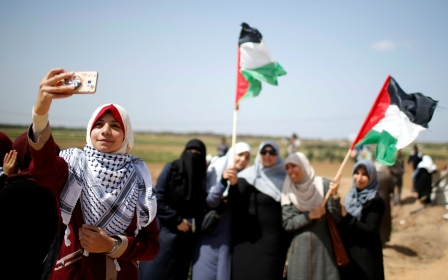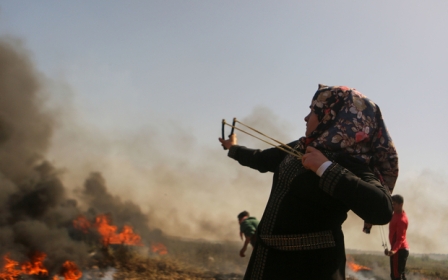Portman pulls out of award, does not want to appear to 'endorse Netanyahu'

Hollywood actress Natalie Portman said she backed out of a Jerusalem ceremony where she was to receive a prestigious award and cash prize to protest against the policies of Israel's prime minister.
"I chose not to attend because I did not want to appear as endorsing Benjamin Netanyahu, who was to be giving a speech at the ceremony," Portman said in a statement posted late Friday on Instagram.
She also denied accusations by Israeli Culture Minister Miri Regev who on Friday said Portman subscribed to the ideology of the anti-Israel Boycott, Divestment and Sanctions (BDS) movement.
“I was sorry to hear that Natalie Portman fell into the hands of the BDS supporters,” he said.
"I am not part of the BDS movement and do not endorse it," the Oscar-winning US-Israeli actress said.
"Like many Israelis and Jews around the world, I can be critical of the leadership in Israel without wanting to boycott the entire nation," she said.
The actor was due to be the recipient of the Genesis Prize, dubbed the “Jewish Nobel,” but withdrew from the ceremony citing extreme distress at “recent events in Israel”.
The Genesis Prize Foundation said it was “very saddened” by the decision. It later announced that it would be cancelling the ceremony altogether.
Oren Hazan, an Israeli politician and legislator, said Portman should be stripped of her Israeli citizenship for her decision and described the incident as "complete craziness".
Portman's directorial debut was the film A Tale of Love and Darkness, adapted from a memoir by an Israeli novelist, depicting the birth of Israel.
Still, other figures online have commended her decision, citing Israeli use of force against Palestinian protesters in Gaza that have left dozens dead and thousands injured.
Both the United Nations and European Union have recently called for investigations into the Israeli army’s use of live ammunition on Palestinians during the “Great March of Return” protests that have been taking place in Gaza since 30 March.
Thirty-six Palestinians have been killed and 4,279 wounded by Israeli forces since the protests started four weeks ago.
Israeli politician Rachel Azaria said Portman's decision was a reflection of changing attitudes towards Israel among US Jews.
“Natalie Portman’s cancellation should be a warning sign,” she tweeted.
“She’s totally one of us, identifies with her Jewishness and Israeliness. She’s expressing the voices of many in US Jewry, and particularly those of the younger generation. This is a community that was always a significant anchor for the State of Israel and the price of losing it is likely to be too high.”
In a statement, the Genesis Prize Foundation said its organisers “fear that Ms Portman’s decision will cause our philanthropic initiative to be politicised, something we have worked hard for the past five years to avoid”.
The prize was launched in 2013 with the purpose of recognising Jewish achievement and contributions to humanity.
When it was announced that Portman would be the 2018 recipient, the actor stated she was proud of her “Israeli roots and Jewish heritage”.
A source at the foundation told Haaretz that Portman did not intend to return the $1m cash prize that comes with the award. Nor was she looking to return the additional grant promised by an Israeli philanthropist.
It is reportedly typical for the recipient to announce which charities they are donating the prize money to six months after the ceremony.
The ceremony was meant to take place on 28 June.
The actor had planned to donate the money to international and Israeli organisations dedicated to women’s causes and had already notified the foundation of this decision.
In 2009, the actor joined others in protesting calls to boycott the Toronto International Film Festival for its staging of a Tel Aviv-themed event.
Following the re-election of Benjamin Netanyahu in 2015, Portman said that she was “very, very upset and disappointed”.
Citing caution in her criticism, the actor added: “I feel like there are some people who become prominent, and then it’s out in the foreign press. You know, shit on Israel. I do not. I don’t want to do that.”
Middle East Eye propose une couverture et une analyse indépendantes et incomparables du Moyen-Orient, de l’Afrique du Nord et d’autres régions du monde. Pour en savoir plus sur la reprise de ce contenu et les frais qui s’appliquent, veuillez remplir ce formulaire [en anglais]. Pour en savoir plus sur MEE, cliquez ici [en anglais].




